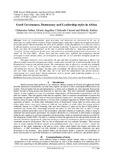Please use this identifier to cite or link to this item:
https://cris.library.msu.ac.zw//handle/11408/3794Full metadata record
| DC Field | Value | Language |
|---|---|---|
| dc.contributor.author | Chikerema, Arthur | - |
| dc.contributor.author | Sithole, Angeline | - |
| dc.contributor.author | Chakunda, Vincent | - |
| dc.contributor.author | Matsika, Kudzai | - |
| dc.date.accessioned | 2020-07-16T13:38:20Z | - |
| dc.date.available | 2020-07-16T13:38:20Z | - |
| dc.date.issued | 2013 | - |
| dc.identifier.issn | 2279-0837 | - |
| dc.identifier.uri | http://www.iosrjournals.org/iosr-jhss/papers/Vol14-issue5/J01456750.pdf?id=6913 | - |
| dc.identifier.uri | http://hdl.handle.net/11408/3794 | - |
| dc.description.abstract | Issues of constitutionalism, good governance and democracy are determined by the type of leadership in a country and/or continent. Despite colonial legacy, leadership in Africa has struggled to promote pro-people policies that accommodate the needs of the populace. Leadership deficiency is a cause for concern in African countries in terms of progressive and visionary leadership. Perspectives on political leadership in Africa vary from the“criminalisation” of the state to political leadership as “dispensing patrimony”, the “recycling “of elites and the use of state power and resources to consolidate political and economic power as stated by Van Wyk (2007) . African states and their leaders have exploited and monopolized internal sovereignty to mean absolute power, persornalisation of state-like services and have monopoly of and over organised violence. This paper attempt to review and analyze the type and styles of political leadership in Africa in an effort to promote democracy and good governance. Leaders play a pivotal role in political agenda setting, the distribution of resources and political actions. The contemporary state in Africa is a remnant of a colonially imposed system. At the time of independence, elites attempted to transform this but only succeeded in entrenching their interests .This paper therefore seeks to unpakage why African countries are no better than they were under colonial rule. Of what value then is the hard won independence that African countries commemorate on a yearly basis? African politicians need to provide good leadership qualities so as to consolidate democracy and good governance. | en_US |
| dc.language.iso | en | en_US |
| dc.relation.ispartofseries | Journal of Humanities and Social Science (IOSR-JHSS);Vol. 14; No. 5: p. 67-70 | - |
| dc.subject | Democracy | en_US |
| dc.subject | Democratic consolidation leadership | en_US |
| dc.subject | Governance | en_US |
| dc.subject | Human rights | en_US |
| dc.title | Good governance, democracy and leadership styles in Africa | en_US |
| dc.type | Article | en_US |
| item.grantfulltext | open | - |
| item.cerifentitytype | Publications | - |
| item.openairetype | Article | - |
| item.fulltext | With Fulltext | - |
| item.openairecristype | http://purl.org/coar/resource_type/c_18cf | - |
| item.languageiso639-1 | en | - |
| Appears in Collections: | Research Papers | |
Files in This Item:
| File | Description | Size | Format | |
|---|---|---|---|---|
| Good Governance, Democracy and Leadership styles in Africa.pdf | Abstract | 382.14 kB | Adobe PDF |  View/Open |
Page view(s)
188
checked on Jan 20, 2026
Download(s)
54
checked on Jan 20, 2026
Google ScholarTM
Check
Items in MSUIR are protected by copyright, with all rights reserved, unless otherwise indicated.



